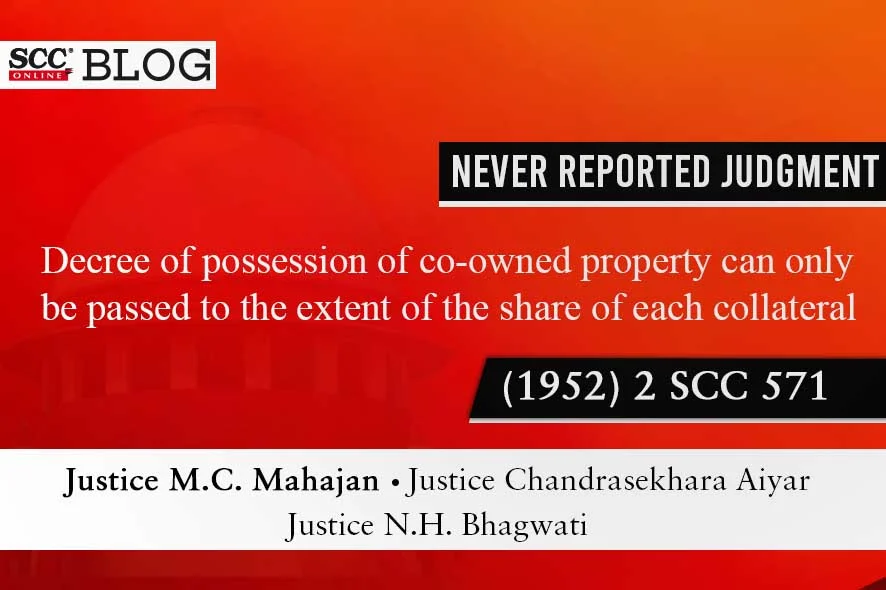Supreme Court: The present case was an appeal by leave of the High Court of Pepsu at Patiala (‘High Court’) from the judgment and decree of the Division Bench of the said High Court dated 8-2-1950 and arises out of a suit instituted by Respondent 1 for possession of agricultural land measuring 87 bighas 14 biswas against appellant. The 3-Judges Bench of M.C. Mahajan*, Chandrasekhara Aiyar, and N.H. Bhagwati, JJ., held that the decree of possession of property could only be made to the extent of the share of each collateral concerned and merely because one collateral had transferred their share by mortgage and gift, it did not mean that the other collaterals would be entitled to a decree of possession of such share as well.
In the present case, two suits were instituted by the collaterals of Daya Singh, one for possession of certain agricultural land that was once held by Daya Singh, husband of Bhago, and the other for declaration that the adoption of Respondent 2, Inder Singh, by Bhago was null and void. Bhago adopted Inder Singh by a deed executed and registered on 23-12-1944. Before Inder Singh’s adoption, Bhago made a gift of 87 bighas 14 biswas to appellant. Thereafter, Inder Singh’s adoption was questioned by respondents, and the gift to appellant was also questioned, out of which this appeal arises.
The common question in the two suits was whether appellant was the collateral of Daya Singh, husband of Bhago, within the seventh degree. The Trial Judge and the District Judge negatived appellant’s contention and dismissed the suits. On second appeal, the High Court found in appellant’s favour and gave them a decree in both the suits.
The value of the land in the suit challenging the adoption was over Rs 20,000 and as the decree of the High Court reversed the decree of the court below, appellant had the right to appeal to the Supreme Court. The value of the subject matter of the suit in the gift case was below Rs 19,000 but as the present case was connected with the other case, a certificate was given for leave to appeal in this case.
The Supreme Court relied on Appeal No. 67 of 1952 and held that appellant was the collateral of Daya Singh in the seventh degree and was entitled to have the gift set aside, as not affecting his reversionary rights.
The Supreme Court noted the submission that the High Court was in error in giving a decree to appellant for the whole of the land in suit. It was said that the husband of Ind Kaur was a collateral of equal degree with appellant and she was entitled to possession of one-half of the land in suit and that appellant was entitled to the other half, and she not having joined in the suit as appellant, a decree for possession in respect of her share could not be passed in favour of appellant. The Supreme Court stated that this contention had force.
The Supreme Court further noted that it was averred that Respondent 2 was also a collateral of the like appellant but that she was transferring her own property by mortgage and gift and appellant was therefore entitled to obtain possession of her share as well. The Supreme Court stated that the ground to claim possession of Ind Kaur’s share was untenable. Ind Kaur submitted that she was a collateral like appellant, and she would look after her rights herself and that appellant had no right to file a suit regarding her half-share. The Supreme Court noted that when the High Court decreed appellant’s suit, it failed to notice that decree for possession in respect of Ind Kaur’s share could not be passed in appellant’s favour and thus, appellant’s suit for possession of the whole land in suit could not be decreed.
The Supreme Court therefore opined that the High Court’s judgment clearly needed correction to this extent. Thus, the Supreme Court allowed the appeal to the same extent and the decree for possession of the whole land in suit passed in favour of appellant was modified and appellant’s suit was decreed in respect to the half of the land in suit with proportionate costs throughout.
[Mehar Singh v. Dhanna Singh, (1952) 2 SCC 571, decided on 04-12-1952]
Note: Decree for possession of co-owned property
Any property jointly owned, becomes a co-owned property and its owners become the co-owners. A co-owner is entitled to the basic right of joint enjoyment or possession of the property. The fact that a joint property has not been divided and is owned by several co-owners, does not curtail the right of a co-owner to give his share to an outsider. Often a co-owner sells his undivided share to a person who is not a member of the joint family (i.e. an outsider). However, mere transfer or sale of a co-owner’s share doesn’t entitle an outsider to take possession of the property.
Advocates who appeared in this case :
For the Appellant: Bakshi Tek Chand, Senior Advocate (A.N. Chona, Advocate, with him)
For the Respondents: Rama Lal Chawla, Senior Advocate (K.N. Aggarwala, Advocate, with him)
*Judgment authored by: Justice M.C. Mahajan







